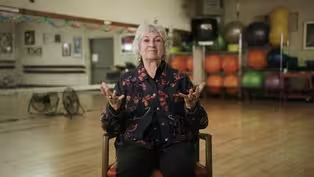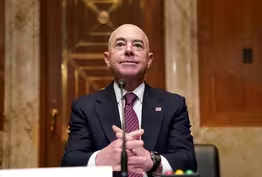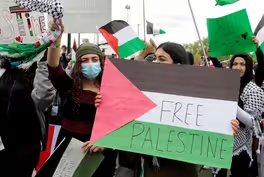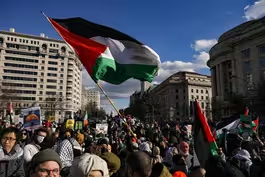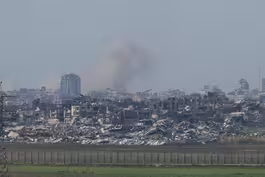
Stories of women who used violence to fight abuse
Clip: 1/30/2024 | 8m 2sVideo has Closed Captions
Author Elizabeth Flock tells stories of women who used violence to fight abuse
In Greek and Roman mythology, the “Furies” are three goddesses who punish the wicked, delivering vengeance to an unfair and unlawful world. William Brangham talks with journalist Elizabeth Flock, a former NewsHour reporter and author of a new book that paints a portrait of three modern-day women who similarly used violence when they had no other option.
Problems playing video? | Closed Captioning Feedback
Problems playing video? | Closed Captioning Feedback
Major corporate funding for the PBS News Hour is provided by BDO, BNSF, Consumer Cellular, American Cruise Lines, and Raymond James. Funding for the PBS NewsHour Weekend is provided by...

Stories of women who used violence to fight abuse
Clip: 1/30/2024 | 8m 2sVideo has Closed Captions
In Greek and Roman mythology, the “Furies” are three goddesses who punish the wicked, delivering vengeance to an unfair and unlawful world. William Brangham talks with journalist Elizabeth Flock, a former NewsHour reporter and author of a new book that paints a portrait of three modern-day women who similarly used violence when they had no other option.
Problems playing video? | Closed Captioning Feedback
How to Watch PBS News Hour
PBS News Hour is available to stream on pbs.org and the free PBS App, available on iPhone, Apple TV, Android TV, Android smartphones, Amazon Fire TV, Amazon Fire Tablet, Roku, Samsung Smart TV, and Vizio.
Providing Support for PBS.org
Learn Moreabout PBS online sponsorshipdelivering vengeance to an unfair, unlawful world.
William Brangham talks with a former "NewsHour"# reporter and the author of a new bo a portrait of three modern-day women who similarly# used violence when they had no other option.
WILLIAM BRANGHAM: In Alabama, Brittany# Smith shot a man who she said had just## raped and nearly killed her and# was choking her brother.
In India,## Angoori Dahariya, a lower-caste# woman unfairly evicted from her home,## rises to become the leader of a gang of women# who punish those who hurt other poor women.
And, in Syria, teenaged Cicek Mustafa Zibo# joins an all-female militia that's fighting## a violent campaign against the Islamic State# group, which is terrorizing their country.
How this violence changes each of these# women and has lasting implications on## them and their broader communities is the# subject of a new book called "The Furies:## Women, Vengeance, and Justice."
And it# is written by journalist Elizabeth Flock.
Liz, so good to have you back on the "NewsHour."
Can you just tell us a little bit more about these# women and why th ELIZABETH FLOCK, Author, "The Furies: Women,# Vengeance, and Justice": Yes, so I started this## project as a jou antiheroes.
They populate so many of our# movies and songs and books and mythology.
And I really wanted to understand why that# was.
And I think we're obsessed with these## stories because we wish in a way that we could# be them.
One in three women has faced domestic## or sexual violence in this country and in# the world.
And so I think when we see these## depictions on screen in pop culture, we wish# that we could be those women fighting back.
And so, as a journalist, my next question# was, are there real-life versions of these## women who have fought back?
So I spent# five years going around the world looking## for women who had fought back against# violence with violence of their own,## and I wanted to understand whether that violence# helped or harmed them and their communities and to## understand why they had to fight back and what# had happened that they hadn't been protected.
WILLIAM BRANGHAM: I mean, that last point seems# to be the central thrust of the whole book,## that, while these women's circumstances are all# quite different, they each felt looking out for me in this given circumstance,# and so they had to take the most drastic step.
ELIZABETH FLOCK: Right.
whether it was the police or the court system or# the state itself.
They hadn't protected women,## hadn't responded to their complaints# of domestic or sexual violence,## and so the women ultimately took up# arms themselves to defend themselves## and their communities, and felt# that they had no other option.
WILLIAM BRANGHAM: I mean, it really is a# condemnation of our collective society.
ELIZABETH FLOCK: Yes.
I mean, I think hey, this is the solution, but it is asking# the question, what would you do if you in a scenario where you were facing domestic# or sexual violence and no one was responding to## your complaints or protecting you?
You would# have to -- would you take up arms yourself?
And so I think that was a question I had as a# journalist throughout this project and trying## to understand.
Brittany Smith shot a man who# she said raped her.
What should she have instead?
Angoori Dahariya was wielding# bamboo canes against domestic abusers,## but that was after police had failed to respond# to complaints of domestic violence for years.
And Cicek was a fighter in an all-female# militia fighting ISIS after the total## failure of the Syrian state.
And so she# felt like there was no other option as well.
WILLIAM BRANGHAM: One of the things# that's so striking about your book is,## you just -- you refuse to romanticize thes I mean, you portray them, in some ways, all# taking heroic and at times inspiring ac but you also show the flip side of that,# that their violence has implications,## that the corruption can come with power,# and that that seems to be a real central## focus of this, that it's not# a rosy image of all of this.
ELIZABETH FLOCK: Yes, I# think, even as a journalist,## when I started out, I did have I thought, wow, this gang of women in# India is fighting domestic abusers.
How## cool.
How interesting.
And even the YPJ in Syria,## the all-female militia that Cicek fights# for, the Western media has gl quite a bit and said, look at these amazing# women wielding Kalashnikovs against ISIS.
WILLIAM BRANGHAM: And sexualized them too.
ELIZABETH FL And the longer I worked on this, the more# complicated I found al struggled with drug addiction.
Angoori was really# invested in her own power.
Cicek really was## obsessed with the ideology of the Kurdish leaders.# And I think that was really important to show.
And that's why you work on a book project# this length, because you're trying to push## back past the two-dimensional depictions# of these kinds of women.
the story of women doing extraordinary things.# But it's also the story of the complications of## that.
And I think, I hope that the reader# would wrestle with that throughout.
Like,## is this OK?
Is this not OK?
Where did they cross# the line with their violence?
What would I do?
And just how complicated all of that is.
WILLIAM BRANGHAM: You were saying before that,# as you have been going out on you have been hearing from other women# who have had kindred kinds of experiences.
Can you explain what you're hearing?
ELIZABETH FLOCK: Yes, I mean, ol der women, and said, I faced some# kind of sexual or domestic abus or even just something as low-level as sexual# harassment, or something really violent, and## felt like they didn't know what to do, that they# looked back and wished that they had fought back,## that they understood what this book was about,# that they felt some kind of rage or violence.
A lot of people have said just the word relatable.# So, I think, unfortunately, it is still such a## silent epidemic, domestic and sexual violence.
We# know it's all around us, but we often don't hear## about it, and I think there's a reason that# these stories really resonate with everyone.
WILLIAM BRANGHAM: In the epilogue of your# book, you say that, as you were saying,## the women's actions both helped and hurt them.
No one gets a happy ending in this book, as# you report, but you also say be cause they live in -- quote -- "damaging# cultures of honor."
What do you mean by that?
ELIZABETH FLOCK: Yes, so all of the# women were punished for fighting back,## right?
And so it's kind of a double thing# that's happening t first, they're not protected, and then they# fight back and then they're punished for it.
So, Brittany was arrested and charged with murder.# Angoori was also arrested and sometime in her community.
And Cicek is suffering with# PTSD from fighting in war, which so often happens.
WILLIAM BRANGHAM: Grievous injuries.
ELIZABETH FLOCK: her arms and legs.
She was hit by drone# strikes.
But I think part of the reason is that I found# all three of these women -- and I didn't choose## these locations.
They -- these locations really# chose me because of the stories that I found,## and I realized that all of them,# whether it was rural Alabama or## Northern India or Northeast Syria, all# of them had these cultures o where honor was such an important concept for the# men that live there and defending their honor.
And I think that is what led to a lot of the# domestic and sexual violence that took place.
And,## as a result, these women were punished# for fighting back and speaking up.
WILLIAM BRANGHAM: The book is "The# Furies: Women, Vengeance, and Justice."
Elizabeth Flock, so great to see you.
Thank you.
ELIZABETH FLOCK: Thank you, William.
A Brief But Spectacular take on the art of dance
Video has Closed Captions
Clip: 1/30/2024 | 3m 6s | A Brief But Spectacular take on the art of dance (3m 6s)
House Republicans move to impeach DHS Secretary Mayorkas
Video has Closed Captions
Clip: 1/30/2024 | 5m 23s | House Republicans move to impeach DHS Secretary Mayorkas (5m 23s)
Michigan mayor snubs meeting with Biden over Gaza
Video has Closed Captions
Clip: 1/30/2024 | 6m 44s | Michigan mayor snubs meeting with Biden over Israel-Hamas war (6m 44s)
Protesters pressure city councils for U.S. action on Gaza
Video has Closed Captions
Clip: 1/30/2024 | 7m 38s | With calls for a ceasefire, protesters pressure city councils for U.S. action in Gaza (7m 38s)
Qatar mediates for a ceasefire between Israel and Hamas
Video has Closed Captions
Clip: 1/30/2024 | 12m | U.S. prepares response to Jordan attack as Qatar pushes for Israel-Hamas ceasefire (12m)
Why manufacturers are slowing electric vehicle production
Video has Closed Captions
Clip: 1/30/2024 | 4m 56s | Why major car manufacturers are slowing production of electric vehicles (4m 56s)
Providing Support for PBS.org
Learn Moreabout PBS online sponsorship
- News and Public Affairs

FRONTLINE is investigative journalism that questions, explains and changes our world.

- News and Public Affairs

Amanpour and Company features conversations with leaders and decision makers.












Support for PBS provided by:
Major corporate funding for the PBS News Hour is provided by BDO, BNSF, Consumer Cellular, American Cruise Lines, and Raymond James. Funding for the PBS NewsHour Weekend is provided by...
